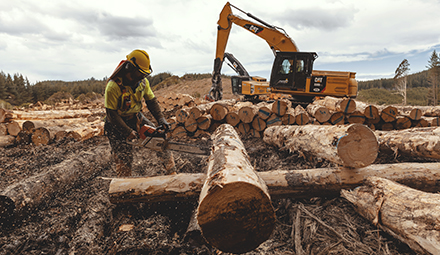Federal Labor’s blue-collar voter pitch is undermined by the Victorian Government’s poverty plan for timber workers. With a renewed global and national focus on transitioning emissions intensive industries to assist in meeting ambitious climate targets, Federal Labor will need to demonstrate to its traditional blue-collar voter base that its promise of a “just transition” is more than weasel words.
Right now, the way the Victorian Government is treating timber workers is undermining Federal Labor’s pitch to voters that workers and communities reliant on transitioning industries will be adequately looked after.
When Labor talks about mitigating the negative impacts on workers and communities who will be impacted by their emissions policies, Labor usually promises to provide a “Just Transition”.
Just Transition is a globally accepted blueprint for securing workers’ rights and livelihoods and assisting their communities as their economies transition to more sustainable industries and is included in the United Nations Climate Change “Paris” Agreement.
But Federal Labor’s task of convincing blue-collar workers and communities that they will be looked after is threatened by the approach of the Victorian Labor Government toward timber workers and their communities.
Because these workers are being thrown on the scrap heap.
When Daniel Andrews announced that his government would halve the Victorian native forest industry from 2024 and shut it down completely by 2030, it was a hammer blow which blindsided thousands of Victorian timber workers, their families and communities, and shocked and devastated an entire industry.
Nothing about that announcement or its implementation has borne any resemblance to the international guidelines on Just Transitions.
These guidelines, endorsed by the International Labour Organization, stress that strong social consensus on the goal and pathways to sustainability is fundamental. Specifically, it recommends that workers not be treated not as “passive bystanders”, but rather as “agents of change.”
A genuinely just transition – one that compensates workers via wages for life or alternative jobs – ensures not only the dignified livelihood of workers who are made redundant and their families, but the survival of their towns and regional centres. The viability of the whole community – the local shops, footy clubs, pubs, schools and more – depends on it.
Far from an ongoing living wage, the Victorian Forestry Plan would see a timber worker who has worked in the industry for 30 years who is made redundant because of the Government’s policy receive a maximum of $23,000 compensation in the form of a redundancy top up payment.
This is insulting and inadequate, even by the standard of previous timber industry restructures. The $23,000 “cap” on government contributions in the Victorian Forestry Plan represents less than a quarter of the Tasmanian and Australian Government’s Transition Support Payment to timber workers when the Tasmanian industry was restructured in 2013, and eligible workers received up to $100,000 from the government.
The level of compensation is also far inferior to the assistance provided by the Bracks and Brumby governments in their Our Forest, Our Future timber industry restructure nearly 20 years ago.
The only type of transition that the current Victorian Government proposal offers for the worker, their family and community is a transition into poverty.
Instead of a Just Transition, the Victorian Government’s Victorian Forestry Plan has alienated a community in a region already battered by power station closures, and devastated by the combined effects of bushfire and the COVID-19 pandemic.
The message received by these workers, their families and communities is this: Labor is not on their side.
The reality facing Federal Labor is that actions speak louder than words. Voters will look to this example of a Labor Government transitioning an industry and see that it will destroy livelihoods and communities in the Latrobe Valley. This will send a shiver down the spine of blue-collar workers and communities all around Australia.
Platitudes in a party platform or a policy document are not good enough. Labor politicians, both in Victoria and Federally, must commit to genuine Just Transition ideals so it means more than a throwaway line in a press release.
Federal Labor’s pitch to blue collar voters in regional Queensland, Tasmania and Western Australia and around the country would be greatly assisted by the Victorian Government re-thinking its Forestry Plan and building dignity and proper support for workers and their communities into it.
Without this rethink in Victoria, the constituents that Labor needs on its side will not trust them and not vote for them.
Michael O’Connor is the National Secretary of the union which represents timber workers, CFMEU Manufacturing and a member of the Australian Labor Party’s National Executive.






